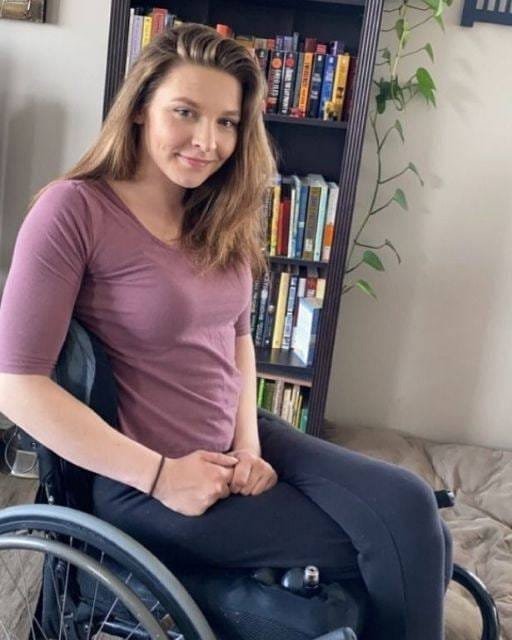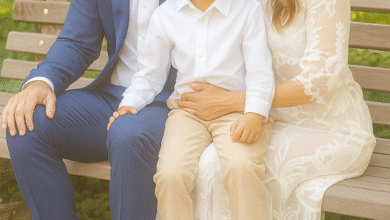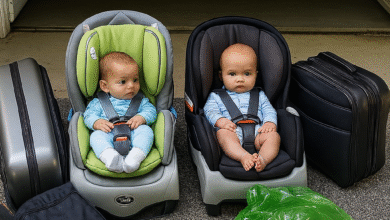I DIDN’T WANT A CAREGIVER — I WANTED MY OLD LIFE BACK.

When they told me I’d never walk again, I didn’t cry. I just nodded, like I was hearing the weather report. Sunny, with a chance of paralysis. I didn’t want pity. No “you’re so strong” speeches. I just needed space to feel like I’d lost something I couldn’t even name.
I flatly refused part-time help when the nurse suggested it. “I’ve got it,” I said. But I didn’t. The kitchen was a war zone, showers were nearly impossible, and utensils seemed determined to fall constantly.
Then Saara arrived.

She wasn’t what I imagined. Younger than I expected, and not sugary-sweet. She didn’t treat me like I was breakable. She simply asked, “Where’s your coffee?” and made a cup like she’d been doing it for years.
At first, I kept my distance. No personal questions, no small talk. She helped with the essentials and left. But over time, I found myself laughing at her dumb jokes. I started setting aside books from my shelf and articles I thought she’d like.
One day, I broke down over something stupid. I dropped a bowl and couldn’t reach it. I just sat there, furious at the world. Saara didn’t rush to fix it. She sat on the floor next to me and said quietly, “It’s not about the bowl, is it?”
Something inside me cracked open.
I didn’t want a caregiver. I didn’t want help. But with her, it felt different. Like maybe I hadn’t lost everything. Like maybe connection didn’t have to mean defeat.
Yesterday, she told me she might move.
I didn’t know what to say.
Saara sat across from me in the living room, holding a tea mug. Same messy hair, same oversized sweatshirt. But her expression was serious. That was unusual for her. A spilled glass of water could become a competitive sport, and burnt toast a viral recipe — she could find humor in anything. But not today.
Finally, she said, quiet but firm: “I’ve been offered a job.” At a clinic. More structured, full-time. Benefits, retirement plan, the whole deal.”
I said, “That’s amazing,” even though my throat tightened. “You deserve that.”
She nodded, then looked at me carefully. “It’s not here,” she whispered. “It’s three hours away.”
Those words hung between us like storm clouds. Three hours. Not another country, but far enough to feel like it.
I forced a smile. “I get it. You can’t pass that up. You’ve worked hard for this.”
She tilted her head. “Are you mad?”
“Mad? Why would I be mad?” Even I heard the hollowness in my laugh. “This is great news, Saara. Really. You should go.”
But inside, I felt gutted. I wanted to scream, to ask her to stay, to tell her how much she meant to me. How she had entered my life unexpectedly. Instead, I stayed silent, picking at the edge of my blanket.
When she tried to bring it up again a few days later, I brushed it off. I told her I understood, that I was happy for her, that I’d manage. Some of that was true. But mostly, I was afraid. Afraid of being alone again. Afraid of going back to how things were before she came — before someone sat on the floor with me while I cried over a shattered bowl.
While helping me sort through old photos — something I’d avoided for months — Saara paused with a picture of me hiking one afternoon. I remembered that day clearly, before the accident. After climbing a mountain, exhausted but exhilarated, my friends and I took selfies with the sky and endless trees behind us.
“You look so happy here,” she said, handing me the photo.
“I was,” I replied, tracing the frame with my finger. I used to love adventure. Now I can barely make it to the mailbox without needing a nap.
Her face softened. “Do you miss it?”
“Of course I do,” I snapped, then sighed. “Sorry. I do. A lot. But does it matter? I can’t go back.”
“No,” she said gently. “But maybe you can move forward.”
“Move forward how?”
She leaned forward, elbows on knees. “There are adaptive sports programs nearby. Have you looked into them?”
I blinked. “Adaptive sports? For me?”
“For anyone willing to try,” she said. “They’ve got wheelchair basketball, hand cycling, even climbing. I looked it up last week — thought you might be interested.”
My chest tightened. Why bother?
“Because I care about you,” she said. “And I think you’re stronger than you believe.”
I sat in silence. The idea of doing anything physical again was terrifying. What if I failed? Embarrassed myself? What if I couldn’t do any of the things I once loved?
But then I thought about Saara leaving. About being alone again, staring at photos of a life I could never get back. Maybe it was time to stop mourning what I’d lost and start seeing what I could still gain.
A week later, Saara took me to the adaptive sports center. The place was alive — wheelchair users laughing, cheering each other on. No pity. Just possibility.
We started slow. At wheelchair basketball, I fumbled the ball and nearly tipped over several times. Saara cheered like it was the NBA every time I managed to dribble. I left the gym sweaty, sore — and smiling.
She handed me a water bottle and said, “You were amazing. I told you.”
“Don’t get cocky,” I teased. But I was proud.
Over the next few weeks, I threw myself into the program. Basketball, hand cycling, even a beginner’s climbing session. Each challenge stretched me in ways I didn’t expect. And Saara was always there — cheering, encouraging, reminding me of what I could still become.
Eventually, she had to go.
That last morning, I wheeled myself into the kitchen and saw her packing. She turned and smiled, eyes bright.
“Ready?” I asked, trying to sound casual.
“As ready as I’ll ever be,” she said. “You? Big game tonight?”
I grinned. “Yeah. First official match. Wish me luck?”
“You don’t need luck,” she said confidently. “You’ve got this.”
We hugged goodbye. And yes, it hurt. But this time, it was different. I knew I wasn’t losing everything. Saara had given me something priceless — the belief that I could still live a full, meaningful life, even if it looked different than before.
That night, I played my heart out. As our team won, I raised my arms, tears streaking down my face. I saw Saara in the stands, surrounded by my teammates’ families. She’d come back — one last time.
Later, in the locker room, she found me beaming.
“See?” she said. “Told you.”
“Thank you,” I whispered, hugging her tightly. “For everything.”
She hugged me back. “Always. Just promise me one thing.”
“What’s that?”
“Keep going.”
I promised.
Sometimes, the people we never expect end up leaving the deepest marks. They remind us to keep fighting, to keep living, and that progress often wears the disguise of loss. Moving forward doesn’t mean forgetting — it means remembering where we came from while choosing not to stay there.





